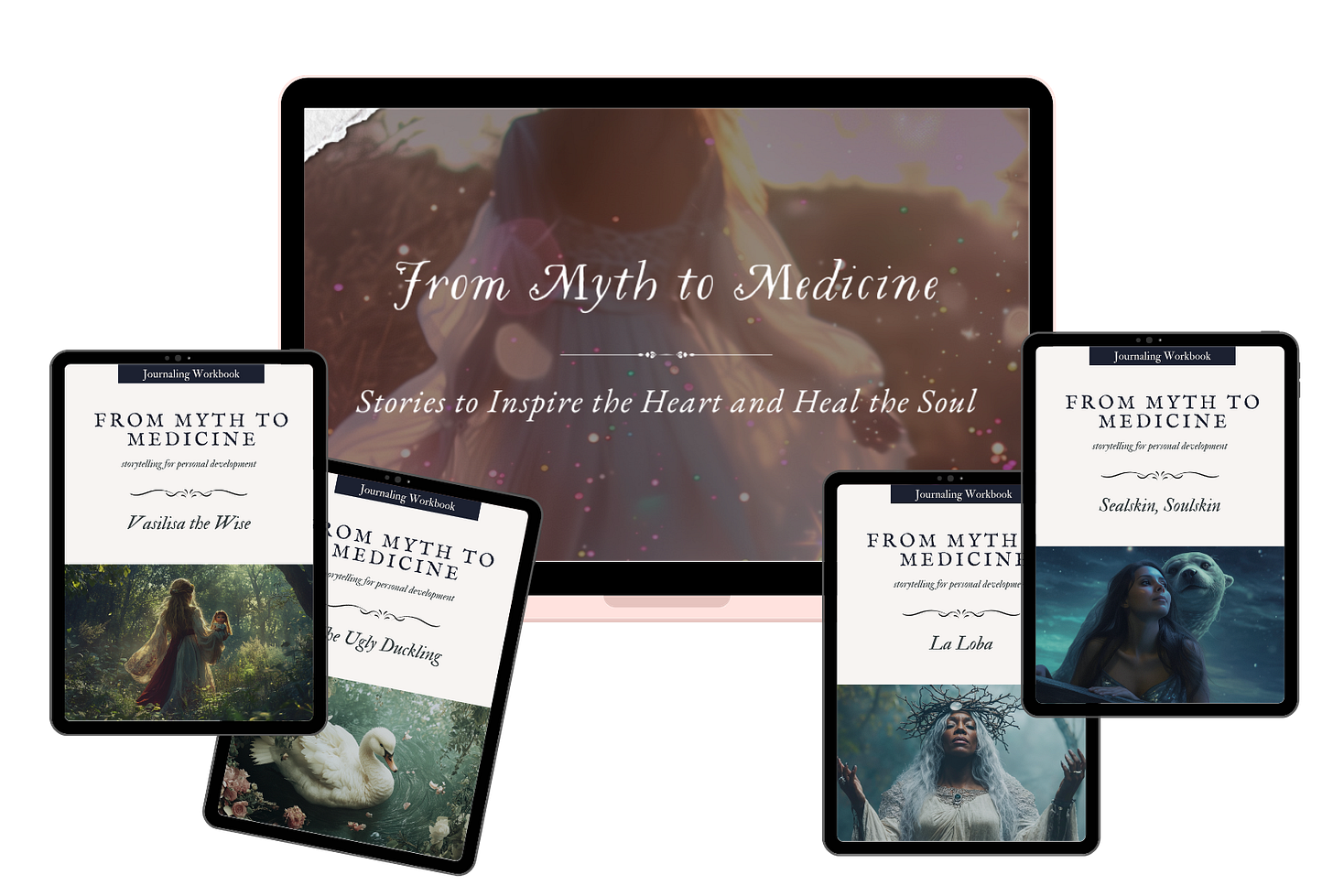If you’re new to The Rebel MFA Way, welcome! This is a bit of a cross-genre essay around writing, mythology, and personal development.
Have you ever looked around at your perfectly good life—the job, the routines, the endless email threads and thought, Is this it? Maybe you’ve caught yourself fantasizing about running away to the woods to live among the moss and coyotes? (Don’t worry, your secret’s safe with me.) That’s not your midlife crisis talking—it’s your wild self, clawing at the edges of the cage modern life has built around it.
The truth is that we’ve been trained to ignore that voice. It’s inconvenient, impractical, and a little too much for polite company. Yet as much as we try to drown it out with productivity hacks and Netflix binges, it never truly goes away. That ache you feel? That’s your soul trying to remind you who you are. And here’s the kicker: it’s not something you can fix with a new planner or another yoga class.
To find your way back to yourself, you need to go deeper. You need to get mythic.
Let’s be honest: “wild” isn’t exactly a vibe most of us get to embody these days. Between answering emails, dealing with obligations, and remembering to schedule that dentist appointment, the closest we get to untamed freedom is hitting “remind me tomorrow” on our to-do lists.
But being wild isn’t about ditching responsibility or going full feral (although the thought is tempting… I’m not opposed to going all Nightbitch for a hot minute).
It’s about reclaiming the part of you that’s honest, instinctive, and unapologetically you. It’s about saying, “This is who I am, and I refuse to shrink to fit someone else’s expectations.”
Ancient myths, like those in Women Who Run with the Wolves, are full of stories that show us how to do exactly that. They remind us that feeling lost doesn’t mean we’re broken—it means we’re in the process of becoming.
Take La Loba, the Wolf Woman who wanders the desert collecting bones. She doesn’t rush or apologize for her scavenging; she knows that every fragment she finds holds the potential for resurrection. She takes her time. She sings over the bones until they rise up, whole and alive again. Her story whispers to us: nothing essential is ever truly lost.
But what does it actually mean to “reclaim your wild self”? It’s not like there’s a checklist for this stuff. (If there were, you’d already have it laminated, right?)
The wild woman archetype isn’t about becoming something new—it’s about unearthing what’s been there all along. It’s a descent, a shedding of the masks and roles that no longer serve you.
Take the maiden in Bluebeard. In the beginning, she is desperate to a solution for her “supposed” problems. She is pushed into the marriage by her mother — the person who is meant to protect her. But the reality is — none of us can be protected from the inner psyche or inner predator. None of us can escape the initiation of discovering truths we’d rather not discover. But we must discover them, nonetheless. And with the maiden’s discovery of Bluebeard’s deeds and her own strength, she reclaims that wild self that knew intuitively what she must do to survive.
And that’s the power of myth: it gives us permission to see our struggles as sacred. It reminds us that transformation isn’t tidy, and healing isn’t linear. It’s messy, raw, and deeply personal.
Actionable Insights to Awaken the Wild Woman
If you’re ready to start your own mythic journey, here are a few prompts to light the way:
What’s in your bone pile?
Grab a journal and ask yourself: What parts of me have I buried to fit in or keep the peace? What feels like it’s waiting to be resurrected? Write down one thing you’d like to reclaim and how it could bring you closer to your authentic self.
What truth is your inner predator keeping from you?
You may not be able to articulate it, but there is a carnal truth inside of you that is hidden behind an inner predator. It could be disguised by your conditioning, education or societal expectations, but it’s there and it’s asking you to find it. What truths do you think are waiting for you?
Who’s in your pack?
Who are the people who truly see and support you? How can you spend more time with them (and less time with those who don’t)?
Remember, this isn’t about “fixing” yourself—it’s about honoring the wholeness that’s already within you.
Your Invitation to Reclaim What’s Yours
Here’s the truth: stepping into your wild self isn’t a solo journey. It takes community, guidance, and a willingness to get uncomfortable. That’s where the From Myth to Medicine seminars come in.
Together, we’ll dive into ancient myths that hold the wisdom we need to heal, grow, and reconnect. You’ll explore stories like La Loba and Bluebeard, reflect on your own journey, and begin to see your struggles as part of a much larger, much more meaningful narrative.
So, if you’re ready to stop ignoring that wild voice and start answering its call, join us. Let’s sift through the bones, shed the layers, and find our way back home—to ourselves and to each other.
Come find your pack. Come reclaim your wild self.









